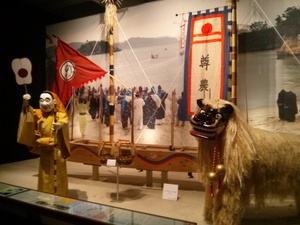Difference between revisions of "Yugafu"
From SamuraiWiki
Jump to navigationJump to search (Created page with "right|thumb|300px|[[Miruku coming ashore during a festival, bringing ''yugafu'', as represented in a museum display at the [[National Museum of Japanes...") |
|||
| Line 1: | Line 1: | ||
| − | [[File:Miruku.jpg|right|thumb|300px|[[Miruku]] coming ashore during a festival, bringing '' | + | [[File:Miruku.jpg|right|thumb|300px|[[Miruku]] coming ashore during a festival, bringing ''yugafu'', as represented in a museum display at the [[National Museum of Japanese History]]. Also seen here are a ''[[shisa]]'' (lion) and ''[[hari]]'' (dragon boat), welcoming the deity.]] |
*''Other Names: amayuu, mirukuyuu'' | *''Other Names: amayuu, mirukuyuu'' | ||
*''Okinawan'': 世果報 ''(yugafuu)'' | *''Okinawan'': 世果報 ''(yugafuu)'' | ||
Latest revision as of 22:51, 21 July 2013

Miruku coming ashore during a festival, bringing yugafu, as represented in a museum display at the National Museum of Japanese History. Also seen here are a shisa (lion) and hari (dragon boat), welcoming the deity.
- Other Names: amayuu, mirukuyuu
- Okinawan: 世果報 (yugafuu)
Yugafuu is an Okinawan term meaning, roughly, "good fortune." The word appears in many ryûka (traditional poems), and classical songs, and is mainly associated with Miruku (Maitreya, J: Miroku), who brings good fortune with him, as he arrives in the village from nirai kanai (a land of the gods, beyond the sea) on the occasions of certain festivals.
References
- Videos and exhibit displays, "Minzoku" (Folk Customs) exhibit, National Museum of Japanese History, Sakura, Chiba. Viewed July 2013.
- "Yugafuu," Shuri-Naha Dialect Dictionary (Shuri-Naha hôgen onsei database).